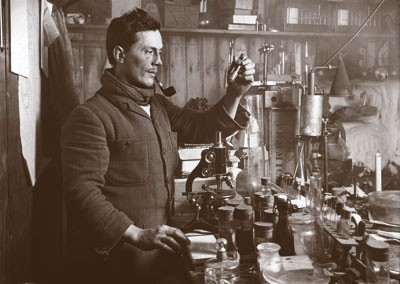Even though this comes from Wikipedia, I cannot dispute it's validity and I am at a complete loss how others can?
I don't find evidence anywhere that this is incorrect because Scott's attempts at adopting more efficient means to travel to the pole and back were anemic and the use of dogs, ponies and tractors never was intended to be south of the foot of the Beardmore Glacier which proves that he always planned dreadful manhauling for the majority of the attempt and which included the period of the approach of winter when manhauling became steadily more untenable. This was a known but nothing appears to have been done regarding it.
Markham deserves his reputation for being a largely toxic force in British polar exploration, I'm afraid.
And, unfortunately, his position was such that his patronage and approval was something that Scott felt he had to constantly cultivate.
Nobody is in disagreement that Scott and his party faced much worse weather than during Amundsen's or Shackleton's earlier effort. The thing is that when planning, margins for the unexpected must be worked in. There can never be any assurance that only benign weather will be experienced. Not enough food was cached and the error on how to preserve fuel played a big role but in the end it was the fact that Scott literally planned to manhaul for 1000miles at the period that summer in the Antarctic was waning was the determining factor. Maybe it could have been pulled off if everything went perfect but when does that happen? Never in my book so as soon as the party began to fall behind their fate became sealed. Perhaps if Scott had clearly ordered a relief party using the dogs met him returning from the pole at between 80deg and 82.5deg he would have lived but we know there was no clear order made for that relief party. This a great mystery as Scott mentions in his diary the disappointment not do be met by the dogs. Why didn't he very clearly say from the start they had to be there ready to meet the pole party at the bottom of the glacier? This of course, lays on Scott's lap as the organizer and the leader
I think there is not as much daylight between us as you may think!
I do not say that Scott was not a bungler, but rather that Huntford overstated how much bungling he did, and that has become more evident with things we have learned in recent years (such as the discovery of Scott's written order to Meares). I do think that
despite the bungling, Scott *could* have made it back if the weather had not been so bad, which at least attests to
some level of competency. Which is what I think Susan Solomon was trying to argue, even if she went too far in the other direction.
The problem with Scott, I suspect, is not that he was an idiot, or even malicious (though he could certainly nurse a grudge, which he unfortunately did against Shackleton), but that he was in certain respects, not very well suited to be an exploration leader, or come to that, a front line naval captain. His gifts - and he did have real gifts - lay elsewhere. He actually did a very smart job of organizing the scientific side of the expedition, which certainly brought back far, far more useful science than Amundsen did. But he kind of got channeled into exploration as his means of advancement within the Royal Navy. As David Crane put it, “In any sensible society, a child of Scott’s type would have ended up as an engineer or scientist, but for a boy of his class in Victorian England the future was circumscribed by the deadening monopoly of the old professions.”
As to what you say about dealing with (and being prepared for) the unexpected, this is of course where Shackleton shines over Scott. Shackleton started out with all the same expectations and prejudices that Scott did, but he learned from their deficiencies, and he was eminently able to adapt. Both of his Antarctic expeditions ran into unexpected Bad Things and yet he managed against all odds to overcome them, and come back alive with all his men. And of course, he was simply better in leading men (and choosing ones who were leadable).
